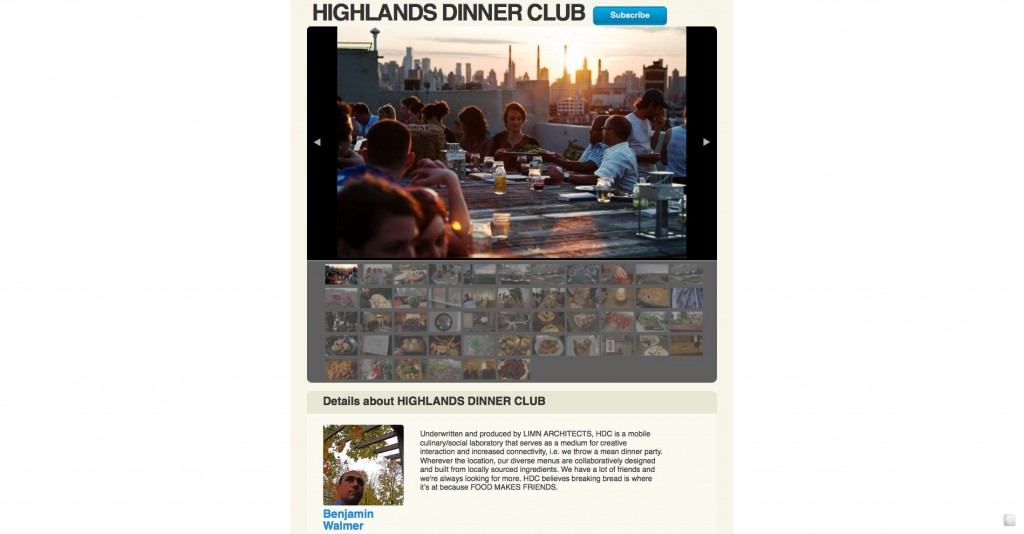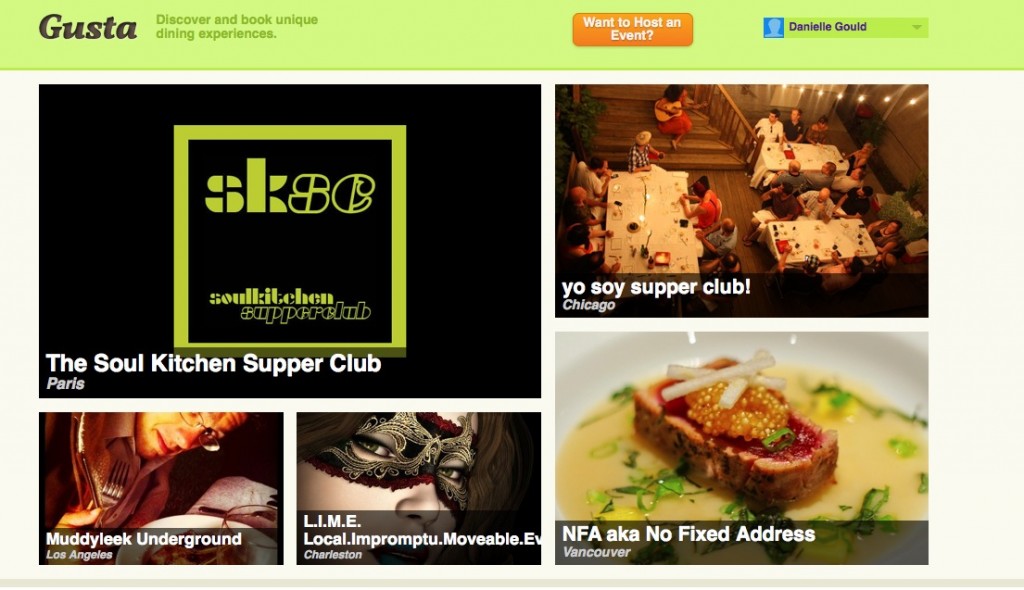How can online interactions fuel offline relationships and experiences?
One increasingly popular approach- make new friends around the table, with the help of technology. Startups like Grubwithus and Spoondate make it easy to meet new people over affordable restaurant meals. Similarly, the explosion of supper clubs over the past four years underscores a growing interest in having more adventurous and deeper social experiences around food than possible at restaurants. Supper clubs are unofficial pop-up restaurants, generally organized by amateur chefs and located in people’s homes. According to the Supper Club Fan Group Ning page, there are 300+ clubs all over the world, although I’ve heard estimates in the thousands.
But, how do you find these people and how do they coordinate logistics?
Meet Carly Chamberlain, co-founder of Gusta, a new platform that aims to help supper clubs, pop-up restaurants, and artisan teachers connect with ‘foodies,’ manage events, and build a reputation through trusted reviews and professional photography. Much like Eventbrite, the site allows chefs to handle invites and payments. Before co-founding Gusta Chamberlain and her partner Chris Collins were ground-floor employees at Airbnb, which will undoubtedly serve them well as they navigate the intricacies of managing both the community and transaction logistics.
I got a chance to speak with Carly to learn more about Gusta and their business model.
____________________
Danielle Gould: What was the inspiration behind Gusta?
Carly Chamberlain: Chris and I find great satisfaction creating online communities that bring people together in the real world. After working together at Airbnb we were introduced to the underground dining scene and quickly encountered the complexity of discovering and booking events. We interviewed chefs to determine the problem and found out that chefs spend a lot of time (up to 10 hours per event) managing invites, collecting payments, and dealing with cancellations. With Gusta, we see an opportunity to help chefs focus on what is most important to them – cooking and collaborating with other people. From a more selfish perspective, we love traveling and eating good food so another large goal is to simplify the process of attending events.
DG: How does the site work? Could you describe some of its features?
KC: Potential attendees can browse photos and reviews of underground restaurants by city, securely book tickets online with a Credit Card, and when the event is over choose to share their experiences through reviews, photos, and comments. We have also developed a free subscription system for events: simply click “subscribe” on any “restaurant” page and you will receive email invites to future events.
For Chefs and event managers, Gusta handles invitations, payment, and international reputation building. To host an event, they fill in basic information (date, # of tickets, price, etc.) and use Gusta’s tools to send out notifications to their Gusta subscribers, existing email lists, and social media outlets. Every step of the process is under their control and designed to work equally well for chefs with 20,000 email subscribers and chefs who want to host their first event.
DG: Supper Clubs are illegal in many states. Does Gusta face any legal issues? If so, how are you addressing those issues?
KC: Every city and country has different rules and regulations on the subject and we therefore ask that each chef be familiar with their local regulations. So far we have found many supper clubs who are functioning legally around the world and will continue to find more.
DG: Who and how large is your market? What are your expansion goals?
KC: While the market is “underground” and therefore difficult to quantify, we’ve discovered thousands of these unique dining experiences happening around the world. Currently we are reaching out to hosts of some of the most unique and well-executed events in order to build a product based on their needs and feedback. Beyond those who are already holding underground events are hundreds of thousands of chefs working for restaurants and hotels. Additionally, there are legions of amateur food enthusiasts who want to host events to meet new people and make some extra money. We aspire to have underground events every day of the week in every major city in the world.
DG: What is your business model and what differentiates you from other sites in this space?
CC: Gusta makes money by charging a 10% fee per ticket to the guest. For instance, if a chef posts a ticket at $30, we charge the guest $33 and keep $3. Compared with generic payment processors such as Eventbrite, Gusta thrives on its personal relationships with chefs who in turn drive our product. Compared to other websites in the space, Gusta is building a more robust, more international website. One specific example is how we decided to handle multiple currencies from day one, so chefs in Buenos Aires, London, and New York can use Gusta with Argentine Pesos, British Pounds, or US Dollars. This international focus means we are building a product that works both when you are in your hometown and when you are traveling around the world.
DG: What have been the most interesting/unexpected things you’ve learned so far?
CC: We have been amazed at the wide range of dining experiences people just don’t know about yet! For example, in New York there is a Supper Club called Forking Tasty that projects cult classics on brick walls while serving delectable cuisine. In Buenos Aires, Cocina Sunae offers cozy tables and hard-to-find Asian cuisine out of her home 3 nights a week. The Phoenix Supper Club in San Francisco rents historic mansions and serves 13 course meals with literally white-glove service. I’m telling you, these are some of the most creative and inspiring people I have ever known. In fact, this realization directly influenced one of our core values: “At Gusta, Chefs are our brand – we simply create tools to make their lives easier”








